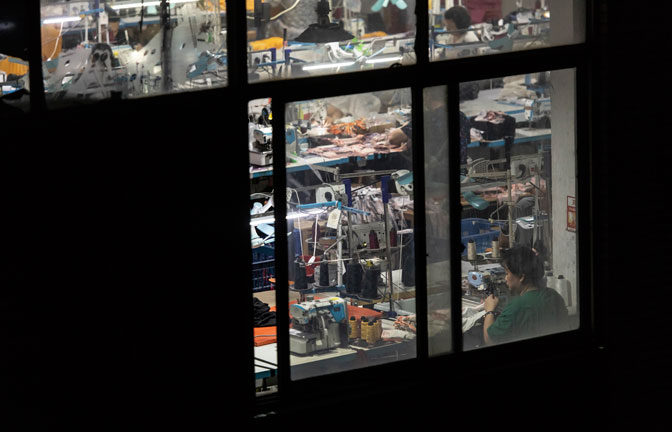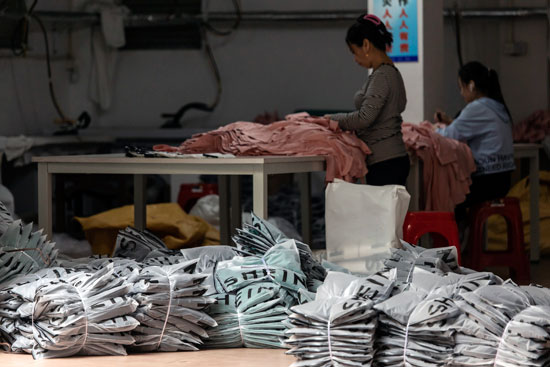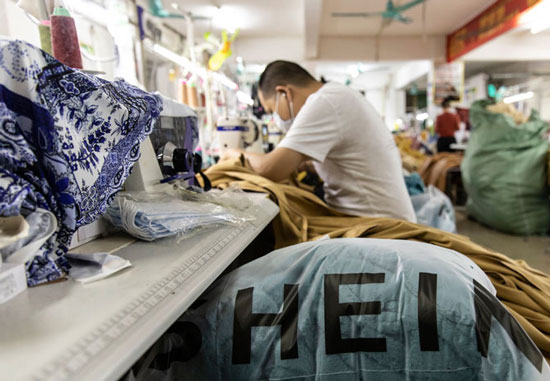
Supply chain garment workers for the fast fashion new boy Shein, toiling at six sites in Guangzhou were found to be working 75-hour weeks in the probe by Switzerland-based Public Eye. The group’s Chinese researchers – whose identities have been kept secret for their protection - visited 17 of the 1,000 factories supplying Shein and its parent company Zoetop, near the Shein headquarters in Guangzhou. It interviewed 10 workers at the sites, which were solely receiving orders from Shein at the time.
The sites included informal workshops “with no emergency exits and with barred windows that would have fatal implications in the event of a fire,” Public Eye said. The garment workers revealed they clocked in for three shifts per day, often with only one day off a month. This violates local labour laws, which set out a maximum working day of eight hours, and a maximum 40-hour working week.
Shein is winning over young shoppers in the US, UK, Europe and Australia by producing fast fashion even faster, and often at cheaper prices, than its rivals Boohoo or Asos. With a production cycle of three to four weeks, Zara was seen as defining fast fashion. Shein can supposedly produce a dress in less than a week – from design to packaging.
David Hachfeld, Public Eye’s garment campaigner and director of the Clean Clothes Campaign in Switzerland, suggested that the long hours observed were “directly linked” to a pay-per-item piece-rate system. In a “good month” several workers said that they might make up to 10,000 Yuan (£1,186). In slow months, their pay could be two-thirds lower. Hacheld said there was “enormous pressure” on staff to turn clothes around quickly.
Shein doesn’t limit its bad employment practices to China. Employees complained of “Chinese standards” at the Shein logistics centre in Liège in Belgium, which handled European returns. The most frequent cause of dismissal was a failure to hit the unrealistic performance targets necessary to earn less than 13 euro (£11) per hour.
Data provider CB Insights estimated the revenues of the private company topped 63.5bn yuan (£7.4bn) in 2020.
Public Eye www.publiceye.ch
|
SHADY BUSINESS Public Eye found Shein’s subcontracted migrant workforce is paying the price for the company’s super cheap, ultra-fast fashion. Low piece-work rates mean long hours and high work pace are the rule.
|
|
MIGRANT TRAP Shein’s employees come without exception from China’s provinces, toil for 11 to 12 hours a day and have only one day off per month. The 75-hour working week violates both Shein’s Supplier Code of Conduct and Chinese labour law. Conditions are similar in Shein’s huge main warehouse located an hour’s drive from Guangzhou. It employs over 10,000 people and operates 24/7.
|
HIDDEN ASSETS Public Eye scrutinised the new fashion empire’s complex corporate structure. It found “a great deal of offshore entities to disguise ownership and avoid taxes.”
|
WORKING HELL Shein’s business model is set up to control as much of the value chain as possible, found Public Eye, while minimising any responsibility. It says through a combination of “a cutting-edge online strategy and archaic working hours, the Chinese newcomer is perfecting the fast fashion industry in a particularly insidious manner.”
|
NEW LOW Shein has taken “shunning responsibility to another level,” says Public Eye. “The only means of countering this development is to impose a requirement of transparency in relation to supply chains and to introduce political guidelines on corporate responsibility,” it said.
|
UNSTOPPABLE? In the United States in spring 2021, the Shein app was downloaded more frequently than that of Amazon, the world’s largest retailer. Shein’s revenues already match those of H&M and Zara’s parent company Inditex.
• ILO Code of practice on safety and health in textiles, clothing, leather and footwear.
• UN Guiding Principles on Business and Human Rights.
• OECD Guidelines on Multinational Enterprises (MNEs).
• ILO Tripartite Declaration of Principles concerning Multinational Enterprises and Social Policy.
DRESSED TO KILL
It may be the most happening fashion chain around. But workers for some suppliers of the Chinese fashion giant Shein are doing excessive overtime in sometimes potentially deadly workshops, an investigation by an advocacy group has found.
More information
Public Eye www.publiceye.ch
Global rules
Images
Click on images for larger versions















